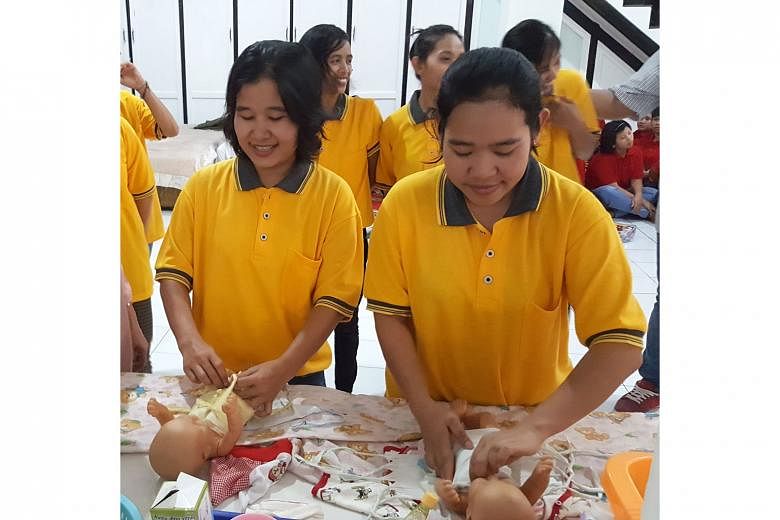KUALA LUMPUR • Like millions of Indonesian women who earn a living through domestic work, Ms Leni Suryani thought that long hours for a meagre salary were just the lot of a maid.
But a pilot training scheme for domestic workers has helped her improve her skills and earn a certificate, giving her the confidence to ask for a higher salary.
"I have been a domestic helper for 15 years. I didn't think this piece of paper was important; I was wrong," said the 33-year-old mother, who worked as a maid in Singapore and Malaysia for six years before returning to Indonesia in 2003.
Ms Suryani is one of the first graduates from the training programme, which aims to enhance domestic workers' skills and win recognition for their work as a profession in a bid to fight exploitation and modern slavery.
While Indonesia is a major provider of maids for places like Singapore, Malaysia, Hong Kong and the Middle East, some four million Indonesian women are also employed in households locally to cook, clean or look after children and elderly people.
Maids account for the biggest group of Indonesian women who work. Despite this, they are not considered formal workers, leaving them vulnerable to abuses and unprotected under local labour laws. Excessive working hours, lack of a formal contract and unpaid wages are just some of the most common abuses Indonesian domestic helpers face, according to campaigners.
Unlike their counterparts who work overseas, who must undergo extensive training regulated by the government, there are no such provisions for local maids.
Ms Suryani said she brushed up on her skills in cooking different cuisines, housekeeping and childcare during her training. She also learnt English as well as how to use computers.
At the end of the 200-hour course last year and after a test, she received a certificate given by a national professional certification board that recognised her skills.
"It taught me how to work more efficiently," she told Thomson Reuters Foundation by phone from Jakarta. "My employers, an American expatriate family, were happy with the certificate I got and the way I work. It gave me confidence to ask for a higher salary and they agreed."
The International Labour Organisation, which runs the training with local workers' groups, said that about 200 women have been trained in different batches since last year, with the most recent group of 40 completing their course in August.
Its national advocacy specialist, Mr Irfan Afandi, said domestic work is poorly regulated in Indonesia and most maids are overworked, underpaid and unprotected.
Some earn as little as the equivalent of US$150 (S$203) a month.
"The laws don't see them as formal workers and many maids themselves are unaware of what exploitation is," he said.
"They think working from 6am to 8pm is normal and that they should do anything they are told - from cooking to car washing and gardening. There is no clear scope of their job."
For Ms Suryani, the certificate helps to break the stereotype that her work is "unskilled" and meant only for the poor and uneducated.
She is now volunteering to train other maids and pass on what she learnt. "I am a proud domestic worker," she said.
REUTERS

